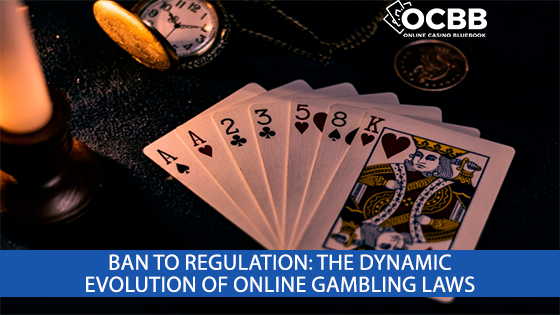
Key Takeaways
- Online gambling has experienced explosive growth in recent years, leading to a shift from outright bans to regulation with consumer protection at its core.
- Unregulated markets in the digital age lacked rules and guidelines, but there has been a transition towards a structured environment with more jurisdictions adopting comprehensive legal frameworks.
- Governments recognize the benefits of regulation, such as player protection and significant tax revenue generation, leading to more countries creating laws that encourage responsible gambling while capitalizing on its economic advantages.
- Advancements in technology, such as blockchain and virtual reality, have the potential to revolutionize online gambling by enhancing transparency, fairness, and creating new legal challenges and debates in the industry.
Early Stages: Outright Bans and Restrictions
In the early days, online gambling wasn’t just frowned upon, it was outright banned and heavily restricted in many regions. Let’s dive into introducing the evolution of online gambling laws by first analyzing the early stages of these regulations.
This era, often referred to as the era of prohibition, showed a clear stance against online gambling. Governments expressed concerns over addiction and potential fraud, leading to strict bans implemented across different jurisdictions. You may remember how difficult it was for players to find reliable platforms due to this heavy regulation.
However, times have changed significantly since then. The rigid attitudes towards online betting began softening as lawmakers started recognizing its economic potential and popularity among citizens. They realized that instead of completely blocking access, they could establish rules and regulations that would ensure fair play while also protecting consumers from scams.
Now let’s pause for a moment and reflect on this transition phase in lawmaking. This shift from complete banishment to gradual acceptance signifies an important step in the dynamic evolution of online gambling laws worldwide. It marks a significant change where governments moved away from blind restrictions towards thoughtful regulation with consumer protection at its core.
Emergence of Unregulated Markets
As the digital age dawned, a wild west of unregulated markets emerged, teeming with risk-takers willing to wager on the toss of a virtual coin. This was especially evident in the rise of unregulated online gambling. With traditional brick-and-mortar casinos facing bans or heavy restrictions, gamblers found solace in these internet-based platforms where laws were either non-existent or lightly enforced, creating a legal gray area in gambling laws.
It’s crucial for you to understand that this era was marked by confusion and chaos. There were no clear rules or guidelines to protect players from fraud or unfair practices. However, it also served as an incubator for innovation and growth within the industry.
Analyzing the shift towards online gambling regulation is essential if we’re to grasp how these dynamics played out. The transition wasn’t overnight; it was a gradual process driven by increasing public outcry and growing recognition of potential revenue streams.
The impact of evolving online gambling laws is dramatic and far-reaching. They’ve transformed an anarchic landscape into a structured environment where businesses can thrive without exploiting consumers. So, while they may constrain some freedoms, they ensure a fairer, safer betting arena for everyone involved. No longer is it about survival but rather about sustainable growth and ethical conduct within the industry.
Shifting Perceptions: Calls for Regulation
You might be wondering how the wild west of digital betting began to change. Well, it’s all down to shifting public perceptions and a growing clamor for some kind of oversight. It’s no secret that the dynamic legal landscape has been slow to catch up with the rapid evolution of online gambling.
The unregulated platforms had their appeal, but they came with substantial risk. Players yearned for accountability, security, and assurance that their money was safe. This led to a shift in the narrative – ‘Shifting Perceptions: Calls for Regulation’. The cry for implementing online gambling regulation became louder as more people recognized its necessity.
With time, lawmakers started listening too. They saw an opportunity not only to protect consumers but also to harness this booming industry’s revenue potential through taxation. Suddenly, instead of banning these virtual casinos outright, governments across the globe started exploring ways to regulate them.
Thus began a new chapter in the world of internet wagering where safety and legality took precedence over unrestricted playtime. Without uttering any concluding remarks or finality statements; it is clear that this transition marked a significant turning point in how we perceive and govern online betting today.
Legalization and Regulation Initiatives
Governments worldwide started to draw up the blueprints for legalizing and controlling these virtual betting platforms, painting a picture of a safer, more regulated internet gaming landscape. These legalization and regulation initiatives were not just about making online gambling legal; they were also about creating an environment where players could bet responsibly and safely.
As you delve deeper into this issue, you’ll find that analyzing global approaches to online gambling regulation can be quite enlightening. For instance, in Europe, countries like the UK have led the way with comprehensive regulatory frameworks that protect both consumers and operators. Meanwhile, in the US, each state has its own set of rules governing online gambling – showcasing a more decentralized approach.
You’d also discover some truly innovative regulatory strategies along your journey. A great example would be Sweden’s Spelpaus system which allows gamblers to self-exclude from all licensed casinos – offering an effective tool against problem gambling.
So there you have it – a glimpse into how the world is evolving towards legalized and regulated online gambling. This transformation hasn’t been easy or straightforward but it’s undoubtedly brought us closer to a safer virtual betting landscape.
Global Perspectives: Diverse Approaches to Regulation
Diving into the global perspectives, it’s fascinating to see the diverse approaches different countries are taking towards controlling internet gaming. Some nations are embracing online gambling with open arms, while others remain hesitant due to consumer protection concerns.
Take for example European Union, where member states have their own unique set of regulations dealing with crossborder complexities of online betting. Despite the EU trying to establish a uniform approach to online gambling laws, individual countries still hold firm on their unique regulatory systems.
On another front is the United States, where it has been a rollercoaster ride of bans and legalization efforts at both federal and state levels. There’s an ongoing debate about consumer protection versus economic benefits.
Over in Asia, countries like Japan and Singapore have strict laws against online gambling but they’re slowly warming up to its potential benefits.
Speculating on the future of online gambling laws is tricky given this global diversity. However, one thing seems certain: more regulation rather than outright bans seem to be coming down the pipeline as governments attempt to strike that delicate balance between protecting consumers and reaping economic rewards from this burgeoning industry.
The Impact on Industry and Players
It’s clear that these shifts in global attitudes are having a profound impact on both the gaming industry and its players. As countries move from outright bans to regulatory frameworks, consumer safeguarding becomes a top priority. You, as a player, can now enjoy more secure and transparent gambling experiences, while operators have clearer expectations about their responsibilities.
You’ll find no shortage of regulatory success stories. Take the UK for instance; its comprehensive approach has resulted in a safer environment for you to place your bets. The same goes for countries like Spain and Italy—they’ve seen significant drops in illegal gambling activities after implementing stringent regulations.
The focus isn’t just on laws and profits though; player wellbeing is also at the forefront of this evolution. Regulators are working hard to ensure you’re not drawn into harmful patterns of play. They’re creating mechanisms that allow you to set your own limits or even self-exclude entirely if necessary.
So, it seems this dynamic evolution is bringing about positive changes for everyone involved. It’s offering you better protection whilst allowing the industry itself to flourish within clear legal boundaries.
Future Trends and Legal Developments
Looking ahead, you’re probably curious about what the future holds for this rapidly changing landscape, aren’t you? With numerous countries slowly opening up to the idea of online gambling, there’s a rising trend towards embracing regulation rather than imposing bans. You can expect more jurisdictions to adopt comprehensive legal frameworks that will enable them to monitor and control the sector effectively.
Governments are now recognizing the benefits of regulation; it not only ensures player protection but also generates significant tax revenue. So, in the coming years, it’s likely that nations will increasingly lean towards creating laws that encourage responsible gambling while still capitalizing on its economic advantages.
On another note, technology continues to drive changes in this industry. Innovations like blockchain could further revolutionize online gambling by enhancing transparency and fairness. And as virtual reality (VR) becomes more mainstream, VR casinos may soon become a reality too.
Don’t be surprised if these advancements lead to new legal challenges and debates. But rest assured, they’ll also push for more progressive legislation ensuring safer and better-regulated online gambling experiences for players worldwide. It’s an exciting time with lots yet to unfold!
Conclusion
So, you’ve seen how online gambling laws have evolved from outright bans to regulation. It’s been a rollercoaster ride for both the industry and players! With diverse global approaches and ongoing changes, you can expect even more transformations ahead. Keep your eyes peeled for future trends and legal developments – it’s bound to be an interesting journey!
Frequently Asked Questions
How can an individual identify if an online gambling site is legal and regulated?
To identify if an online gambling site is legal and regulated, you’d have to check the website’s licensing information. It’s usually found in its privacy policy or about us page. Always verify with the issuing authority.
What are the potential penalties for operators of unregulated online gambling platforms?
Operators of unregulated online gambling platforms can face severe penalties. These may include hefty fines, imprisonment, or both. It’s crucial for you to ensure your platform is legally regulated to avoid such consequences.
How do online gambling laws differ from traditional gambling laws?
Online gambling laws differ from traditional ones mainly in their focus on protecting players online. They deal with issues like data privacy, fair play, and prevention of underage gambling that aren’t as prevalent offline.
How are problem gambling and gambling addiction addressed in the regulation of online gambling?
Online gambling regulations often include measures to tackle problem gambling and addiction. They might require sites to offer self-exclusion tools, limit betting amounts, or provide resources for help with gambling-related issues.

